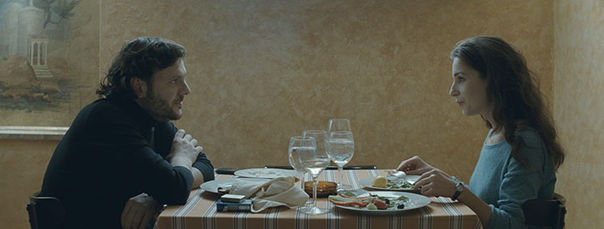Structuring the Reality
Karla Lončar of the 2013 Talent Press Sarajevo reviews Corneliu Porumboiu's latest work, the arthouse film about film WHEN EVENING FALLS ON BUCHAREST OR METABOLISM.

Corneliu Porumboiu's WHEN EVENING FALLS ON BUCHAREST OR METABOLISM.
It seems that language itself denotes a constant preoccupation for Corneliu Porumboiu, author of the two feature-length successes 12:08 EAST OF BUCHAREST and POLICE, ADJECTIVE. His latest feature, WHEN EVENING FALLS ON BUCHAREST OR METABOLISM, follows the same interest: although its plot is about a director slightly concerned with his professional and intimate life, its narrative strongly suggests that it is more a film about film than anything else. Ascetic and minimalistic, with strong realistic tendencies, its poetics resembles those of the other Romanian New Wave directors, as well as Porumboiu's own previous work.
Its opening sequence stresses the importance of considering the language of film, verbalized through the protagonist, film director Paul (Bogdan Dumitrache). Shot in one long take, it depicts Paul explaining his aesthetic preferences to Alina (Diana Avramut), minor actress in film he directs. Paul is not particularly interested in digital filmmaking – he thinks that films should be filmed with film, leaving particular shots no longer than 11 minutes, which is the limit imposed by the length of one film roll. As expected, takes in Porumboiu’s film won't last longer than 11 minutes.
His concerns about the future and nature of film reflect his views on fiction and reality. To Paul, and potentially Porumboiu, the reality illustrated in film that is not digital has to be as "realistic" as possible – except that it must also be limited in time. In Porumboiu's film, the effect of reality is achieved by using preferably long, objective takes of actors naturally reacting to their environment, constructed by an austere mise en scène and a story that lacks in strong narrative line.
Although we hear Paul talking about his film and the medium itself, we don't ever get to see Paul's product, just numerous rehearsals for one particular scene, the only one in which Alina acts. Paul's work is presented as somewhat undefined, just like every aspect of his life. Following the protagonist's lethargic attitude, the action doesn't even take place in front of the camera. Instead, Porumboiu tends to statically illustrate a series of conflicting but unemotional conversations, mostly between Paul and Alina, in sterile surroundings. He accentuates their isolation by filming them in interiors without much noise and interference. Their dialogue is meticulously crafted but their personal histories mostly remain unsaid or unclear. However, contrary to the potential vagueness of the plot, the structure of film is carefully considered, precise and well defined.
It seems that Porumboiu refers to the very things that dictate the human approach to film and life as we know it – to time and mind, whoever and whatever the latter reacts on, as it is suggested by the title of the film. Metabolism, as the life-sustaining process of digestive actions, serves as a persuasive metaphor for the power our minds. Although we are mostly unaware of it, it is influenced by it, sometimes in a pathological way – as it could be the case with gastritis, a motif graphically shown in a medical video of endoscopy that is inserted into the film.
The film's emphasis on form more than the subject has the effect of distancing the viewer from the content, leaving the audience cold – but potentially raising many questions. If you are a person who likes to be mentally stimulated, this film will certainly provide a pleasurable experience. However, the audience unused to metafilmic arthouse films, or anyone who expects a more conventionally critical approach, noticeable in Porumboiu’s previous feature length films, would surely find it hard to absorb.

